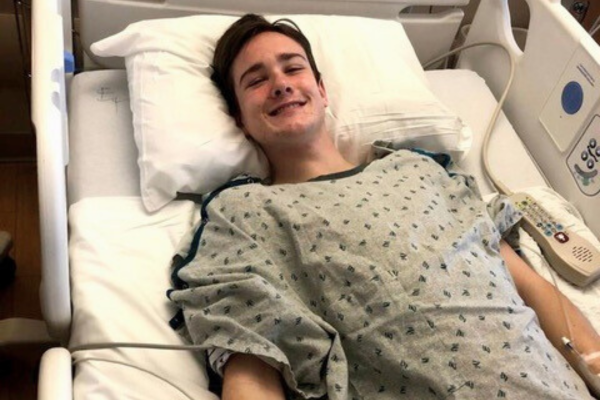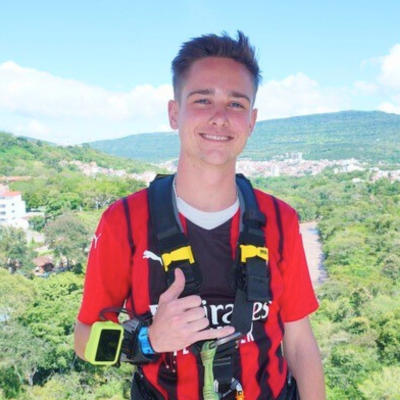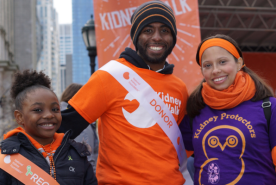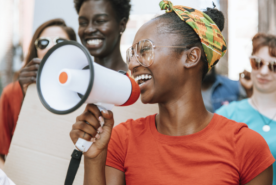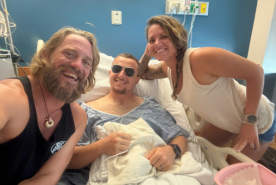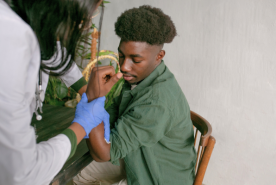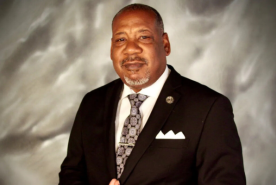August 21, 2025
In college, Dan learned about kidney failure. That lesson inspired him to donate a kidney to a stranger and become a strong advocate for kidney health.
Before 2020, Dan O’Connell had never given much thought to kidney disease. He had no family history and didn’t know anyone who had been affected by it. But a book assignment in Dan’s sophomore year of college changed everything. What he learned about kidney failure inspired him to donate a kidney to a stranger and become an advocate for kidney health.
An Eye-Opening Book
In 2020, Dan was studying psychology at Saint Louis University. While taking a class on health and society, he was assigned to read Laurie Kaye Abraham’s 1993 book, Mama Might Be Better Off Dead: The Failure of Health Care in Urban America.
“It’s a true story about a journalist who follows four generations of a Black family living in one of the most underserved communities in Chicago,” Dan said.
The book revealed how poverty and systemic inequities make living a healthy lifestyle and accessing affordable, quality healthcare extremely difficult. Without preventative healthcare, issues like high blood pressure and diabetes can lead to kidney failure.
“One of the family members was on dialysis,” Dan said. “He finally had consistent insurance through Medicare, but it came too late to prevent his disease or improve his quality of life.”
Dan also learned that dialysis is like a full-time job. Those who get in-center hemodialysis go three days a week, four hours per session, and the barriers patients face, like needing reliable transportation, medication, and a care partner.
“Despite everything the family did, their loved one never received a transplant,” Dan said. “That stuck with me.”
That’s when the idea first came to him: “Maybe I could donate a kidney.”
What It’s Like to Be Evaluated for Living Kidney Donation
A few weeks later, Saint Louis University closed the campus due to COVID-19. Dan used the time to research kidney donation.
“I learned a healthy person can safely donate a kidney and live a normal life afterward,” he said.
Dan contacted a local transplant hospital when the campus reopened to begin the kidney donor evaluation process.
“It took longer than usual to fill out the initial paperwork because of the pandemic,” Dan said. “They were navigating the process virtually for the first time.”
Once Dan passed the initial review, the testing began.
"I was studying for my undergrad degree and working as a substitute teacher,” he said. "Balancing my busy life with testing wasn’t easy."
But Dan’s care team was accommodating.
“It took a few months,” Dan said. “But I got the bloodwork, urinalysis, and medical scans done. I also met with various members of the transplant team to talk about my mental health, finances, and recovery.”
While there were many appointments, it never felt overwhelming to Dan.
“Donating a kidney to a stranger is called an altruistic or non-directed donation,” he said. “My team was so appreciative of me, and the appointments were spread out enough that I never felt like I was drowning.”
Donating a Kidney to a Stranger
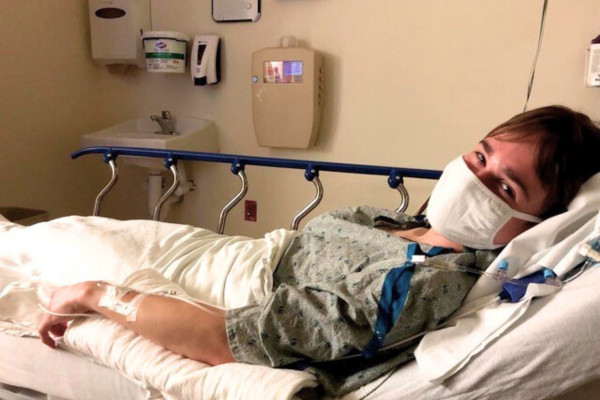
In March 2021, Dan donated a kidney to a stranger in need. At the time, he’d only been dating his girlfriend for about six months.
“I waited until I was approved to tell her,” Dan said. “She was supportive and offered to help me recover. Her dad was skeptical. He thought I should wait until I was older.”
Dan also told his professors.
“They were great about giving me excused absences,” Dan said. “My immunobiology professor was especially excited because we were learning about organ donation in class.”
After surgery, Dan recovered at his girlfriend’s apartment with help from her roommates.
“Recovery was easy for me,” he said. “My friends made a schedule, so I was hardly ever alone. They were amazing.”
He even planned the surgery during a week when the students he taught were on break.
“I donated on Tuesday, recovered for a week, and went back to work the next Monday,” Dan said. “My coworkers had no idea.”
Considering donating a kidney or looking for a living donor? Watch videos by living kidney donors to learn more.
Subscribe today!
Join the NKF Blog Newsletter
Get inspirational stories and kidney disease resources delivered to your inbox every month. You'll gain practical insights and expert advice to help you better understand and manage your kidney health, no matter where you are on your kidney journey.
How Dan Became a Kidney Advocate
For a while, Dan kept his donation to himself.
“It was just a thing I did, a random fun fact,” Dan said. “Telling people felt weird, like bragging about being selfless.”
But over time, Dan realized that sharing his story could help others understand living kidney donation.
“I joined NKF’s advocacy group, Voices for Kidney Health, in 2024,” Dan said. “This platform taught me how to advocate with lawmakers for better kidney policies.”
Dan also made friends with other advocates and learned more about the challenges faced by people on dialysis.
“Hearing personal stories of people on the waiting list was enlightening,” Dan said. “It inspired me to create an advocacy platform.”
Dan views this platform as a way to educate others and challenge common transplant myths.
“People in my life told me I was too young to donate, but I was in good health and have had no issues,” Dan said. “Others asked what would happen if a family member needed a kidney?”
That’s where the National Kidney Registry (NKR) comes into play. NKR helps match donors and recipients. They also offer voucher programs, which let donors name a loved one to receive a priority transplant in the future if needed.
People who donate through an NKR Member Center also receive support through their Donor Shield program, including;
- Up to $2,000/week (max 12 weeks) in lost wages
- Up to $6,000 for travel, lodging, meals, childcare, or pet care
- Health complication coverage, including income and travel
- Legal and insurance protection if any issues arise
By sharing his story, Dan can help more people find resources like NKR and inspire more people to donate.
Have questions about living kidney donation? Call NKF CARES toll-free at 855.653.227 or send a message to speak with a trained NKF professional.
Deepening His Commitment
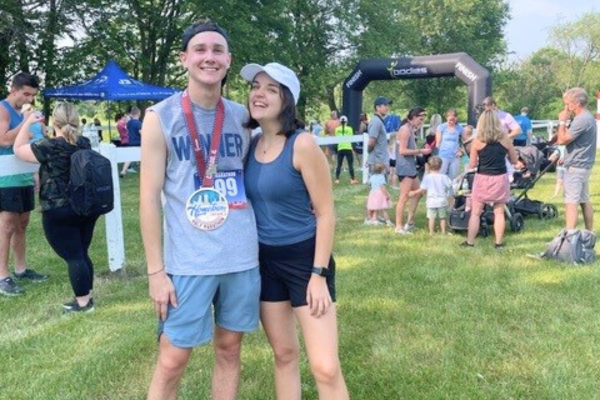
In 2024, Dan ran his first marathon to prove that kidney donation hasn’t slowed him down.
“It wasn’t directly tied to kidney donation, but it showed that donors don’t have to stop doing what they love,” he said.
Since then, Dan has completed three more marathons. His goal is to run 50 marathons in 50 states before his 50th birthday.
“You don’t have to run marathons if you donate a kidney, but you can,” Dan said. “You can still do all the things you want to do.”
Now a doctoral student in clinical psychology at the University of Houston, Dan’s passion for advocacy has only grown.
“I research the mental health of immigrants, focusing on trauma and how it develops before, during, and after the immigration process,” Dan said. “I’ve also started attending NKF’s Kidney Patient Summit on Capitol Hill.”
At the 2025 Summit, Dan had even more opportunities to meet people living with kidney disease.
“Hearing people’s stories only strengthened my desire to help,” Dan said, “Getting lawmakers to enact new laws is a slow but necessary process to make change. NKF gives you the tools you need to do so.”
Become a Voices for Kidney Health Advocate
Dan’s choice to donate a kidney grew into a mission to advocate and show that life keeps going after donation.
Ready to raise your voice and make a difference, like Dan? Become a Voices for Kidney Health advocate today.
